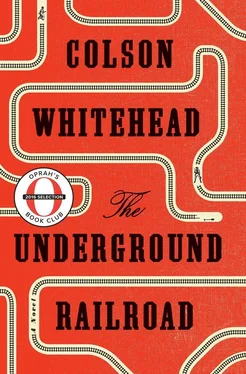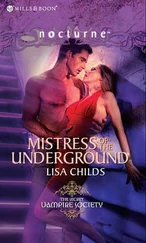She approached him the night of Terrance’s address and he acted as if she had agreed long before. Caesar was like no colored man she had ever met. He had been born on a small farm in Virginia owned by a petite old widow. Mrs. Garner enjoyed baking, the daily complications of her flower bed, and concerned herself with little else. Caesar and his father took care of the planting and the stables, his mother the domestic affairs. They grew a modest crop of vegetables to sell in town. His family lived in their own two-room cottage at the rear of the property. They painted it white with robin’s egg trim, just like a white person’s house his mother had seen once.
Mrs. Garner desired nothing more than to spend her final years in comfort. She didn’t agree with the popular arguments for slavery but saw it as a necessary evil given the obvious intellectual deficiencies of the African tribe. To free them from bondage all at once would be disastrous — how would they manage their affairs without a careful and patient eye to guide them? Mrs. Garner helped in her own way, teaching her slaves their letters so they could receive the word of God with their own eyes. She was liberal with passes, allowing Caesar and his family to range across the county as they pleased. It rankled her neighbors. In her degrees, she prepared them for the liberation that awaited them, for she had pledged to set them free upon her death.
When Mrs. Garner passed, Caesar and his family mourned and tended to the farm, awaiting official word of their manumission. She left no will. Her only relative was a niece in Boston, who arranged for a local lawyer to liquidate Mrs. Garner’s property. It was a terrible day when he arrived with constables and informed Caesar and his parents that they were to be sold. Worse — sold south, with its fearsome legends of cruelty and abomination. Caesar and his family joined the march of coffles, his father going one way, his mother another, and Caesar to his own destiny. Theirs was a pathetic goodbye, cut short by the whip of the trader. So bored was the trader with the display, one he had witnessed countless times before, that he only halfheartedly beat the distraught family. Caesar, in turn, took this weak licking as a sign that he could weather the blows to come. An auction in Savannah led him to the Randall plantation and his gruesome awakening.
“You can read?” Cora asked.
“Yes.” A demonstration was impossible of course, but if they made it off the plantation they would depend on this rare gift.
They met at the schoolhouse, by the milk house after the work there was done, wherever they could. Now that she had cast her lot with him and his scheme, she bristled with ideas. Cora suggested they wait for the full moon. Caesar countered that after Big Anthony’s escape the overseers and bosses had increased their scrutiny and would be extra vigilant on the full moon, the white beacon that so often agitated the slave with a mind to run. No, he said. He wanted to go as soon as possible. The following night. The waxing moon would have to suffice. Agents of the underground railroad would be waiting.
The underground railroad — Caesar had been very busy. Did they really operate this deep in Georgia? The idea of escape overwhelmed her. Apart from her own preparations, how would they alert the railroad in time? Caesar had no pretext on which to leave the grounds until Sunday. He told her that their escape would cause such a ruckus that there would be no need to alert his man.
Mrs. Garner had sown the seeds of Caesar’s flight in many ways, but one instruction in particular brought him to the attention of the underground railroad. It was a Saturday afternoon and they sat on her front porch. On the main road the weekend spectacle strolled before them. Tradesmen with their carts, families walking to the market. Piteous slaves chained neck to neck, shuffling in step. As Caesar rubbed her feet, the widow encouraged him to cultivate a skill, one that would serve him in good stead as a freeman. He became a woodworker, apprenticing at a nearby shop owned by a broad-minded Unitarian. Eventually he sold his handsomely crafted bowls on the square. As Mrs. Garner remarked, he was good with his hands.
At the Randall plantation he continued his enterprise, joining the Sunday caravan into town with the moss sellers, penny seamstresses, and day laborers. He sold little, but the weekly trip was a small, if bitter, reminder of his life in the north. It tortured him at sundown to tear away from the pageant before him, the mesmerizing dance between commerce and desire.
A stooped, gray-haired white man approached him one Sunday and invited him to his shop. Perhaps he could sell Caesar’s crafts during the week, he offered, and they might both profit. Caesar had noticed the man before, strolling among the colored vendors and pausing by his crafts with a curious expression. He hadn’t paid him any mind but now the request made him suspicious. Being sold down south had drastically altered his attitude toward whites. He took care.
The man sold provisions, dry goods, and farming tools. The shop was devoid of customers. He lowered his voice and asked, “You can read, can’t you?”
“Sir?” Saying it like the Georgia boys said it.
“I’ve seen you in the square, reading signs. A newspaper. You have to guard over yourself. I’m not the only one can spot such a thing.”
Mr. Fletcher was a Pennsylvanian. He relocated to Georgia because, he found out belatedly, his wife refused to live anywhere else. She had a notion about the air down here and its ameliorating effects on the circulation. His wife had a point about the air, he conceded, but in every other way the place was a misery. Mr. Fletcher abhorred slavery as an affront before God. He had never been active in abolitionist circles up north but observing the monstrous system firsthand gave him thoughts he did not recognize. Thoughts that could get him run out of town or worse.
He took Caesar into his confidence, risking that the slave might inform on him for a reward. Caesar trusted him in turn. He had met this sort of white man before, earnest and believing what came out of their mouths. The veracity of their words was another matter, but at least they believed them. The southern white man was spat from the loins of the devil and there was no way to forecast his next evil act.
At the conclusion of that first meeting Fletcher took Caesar’s three bowls and told him to return next week. The bowls didn’t sell, but the duo’s true enterprise thrived as their discussions gave it form. The idea was like a hunk of wood, Caesar thought, requiring human craft and ingenuity to reveal the new shape within.
Sundays were best. Sundays his wife visited her cousins. Fletcher had never warmed to that branch of the family, nor they to him, owing to his peculiar temperament. It was commonly held that the underground railroad did not operate this far south, Fletcher told him. Caesar already knew this. In Virginia, you could smuggle yourself into Delaware or up the Chesapeake on a barge, evading patrollers and bounty hunters by your wits and the invisible hand of Providence. Or the underground railroad could help you, with its secret trunk lines and mysterious routes.
Antislavery literature was illegal in this part of the nation. Abolitionists and sympathizers who came down to Georgia and Florida were run off, flogged and abused by mobs, tarred and feathered. Methodists and their inanities had no place in the bosom of King Cotton. The planters did not abide contagion.
A station had opened up nonetheless. If Caesar could make it the thirty miles to Fletcher’s house, the shopkeeper pledged to convey him to the underground railroad.
“How many slaves he helped?” Cora asked.
“None,” Caesar said. His voice did not waver, to fortify Cora as much as himself. He told her that Fletcher had made contact with one slave previous but the man never made it to the rendezvous. Next week the newspaper reported the man’s capture and described the nature of his punishment.
Читать дальше












